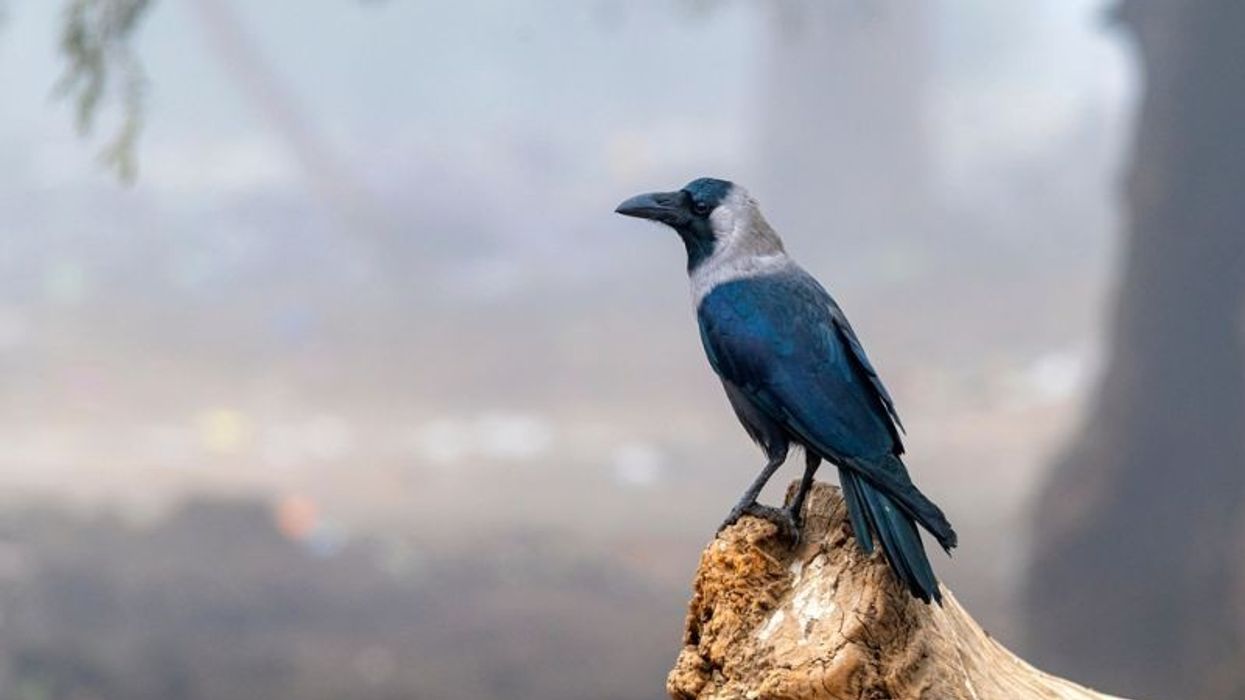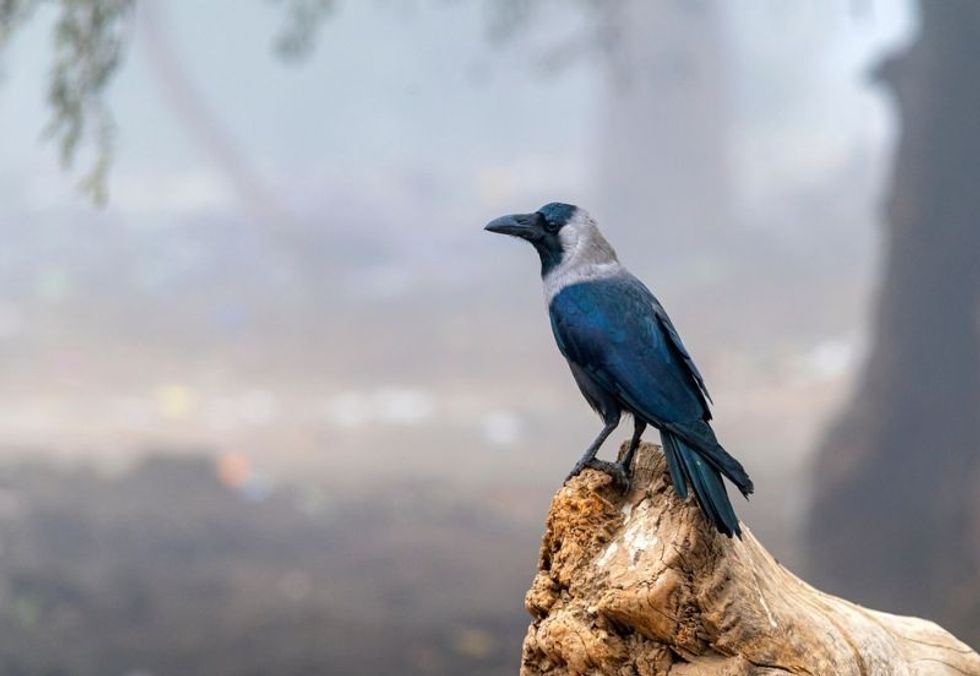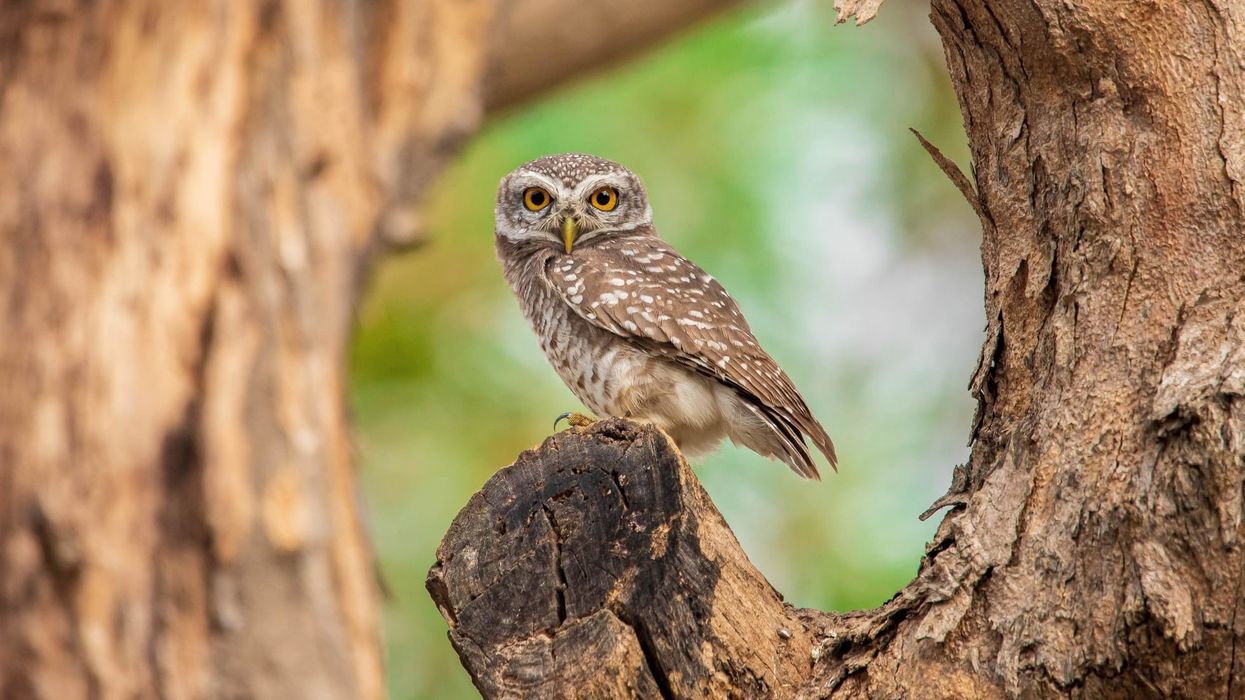Crows, one of the most intelligent and charismatic birds, are capable of mimicking human voices!
Do you remember the short story in which the crow fills the container with pebbles to raise the water when it's thirsty? Yes, they have an intellect capable of problem-solving, identifying faces that are potential threats or safe.
Crows are also highly adaptable and are found everywhere in Asia, the Americas, Europe, and Africa. They are found in forests, human habitats, grasslands, deserts and are all-pervasive.
There are about 40 species of crows of varying sizes. American crow usually is approximately 17- 19 in (45-48 cm) long and can weigh about 7.75 - 3.6 lb. (0.34 to 6.2 kg).
Ravens are larger than crows, and rooks are smaller. They have shiny black feathers with thick and strong beaks, called a bill. Some species have white patches on their feathers. In proportion to their bodies, they have larger brains in size as well as function. The bigger brain size makes them intelligent animals.
Crows are omnivores and eat both animals like eggs, reptiles, rodents, small birds, and plants. They are predators as well as scavengers, as they feed on anything.
They are intelligent creatures that follow wolf packs and also guide them to locate prey. They also eat seeds, nuts, grains, fruits, including garbage.
These wild animals are smart enough to understand which food spoils faster and which can be stored. They differentiate between types of food like meat, nuts, and grains, and store items like bread in caches or tree cavities, for the short term to eat later.
Though many types of crows are solitary, they roost in groups. Younger animals are happier to roost groups.
A group of crows, called murder, forage together and surround a dead crow, not just to mourn but also to find the root cause! The gathering of these social creatures, in this instance, resembles a funeral.
They use this opportunity to understand the threats looming from people, places, and situations and try to attack the killer and protect their mob.
Crows are not migratory birds and find warmer spaces during winter in the same territory. They fare well in cities and co-exist with humans.
They recognize human faces and can remember them for almost a decade. They also differentiate the colors of the food container boxes. Crows can even solve puzzles, and as playful birds, they also play sports like tug of war or more.
If you enjoyed reading about crows, you could further explore our other fun facts articles, how to attract crows? And how to befriend a crow?
Is it illegal to keep a crow as a pet?
Crows are wild birds and are rarely kept as pets. They are intelligent birds and though they are solitary, have a good amount of social life. Most often, they are seen flying in the sky and roosting on the homes. Rarely, you may find a crow in a cage as a pet.
The migratory bird act protects them from caging by the law. As per this law, it is illegal to capture, kill, sell, trade, or transport any native corvid migratory bird migratory, including crows.
So, it is unlawful to own a crow as a pet. Indeed, caging a free bird seems like an inhuman act, even from a psychological perspective. It is like curtailing the freedom of the birds, which fly high and can affect their mental health if the bird does not enjoy the cage environment.
African Pied Crows As Pets
Just as humans are happy being with their family and feel very lonely if separated, ravens also feel incredibly lonely if they get separated from their family. Crows and Ravens are very social creatures that can get mentally ill and depressed if forced into solitude.
African pied crows are not native to the USA, and being a foreign species, they can be kept as pets. Many hobbyists keep this variety of corvids as pets. These birds are unusually brilliant and can mesmerize you with their intelligence.
They can mimic your words excellently and bond with you if you are the owner. Their excellence in repeating your words can make you fall in love with them. They are equally sensitive and can feel hurt if your behavior towards them is not smooth or unthinking.
African pied crows can be very mischievous and are capable of destroying anything with their strong beaks. Never let these pets in a room without crow-proofing it. These birds are very active, and being large, they need a lot of flying space.
The best way is to have them in a commercial outdoor aviary. They also need space in the house and time along with people. Else this pet crow can quickly become unmanageable. They can engage with people, follow their phone conversations and television shows.
Even with all these, they need out-of-cage time with toys and people interaction. to remain stimulated. It would be best if you were watchful of their formidable weapon, the beak while handling them.
Though the African pied crow is an omnivore, it would lean towards rodents, carrion, insects, eggs along with vegetables, nuts, and fruits. A handful of crickets to feed them would be a feast.
Do crows make good pets?
There is evidence where murder can pull the tail of a predator to divert its attention. Crows are so smart that they can group up to pull the leg of their predator! Then, other crows of the murder can snatch the food or escape from the predator.
Crows are wild animals and do not make good pets because they are not made for captivity. They fly in the open sky and roost as groups on homes.
They are wildlife, intelligent creatures that cannot live in a constrained cage.
Crow as a pet is never heard of, and crows and ravens are only born to live in wildlife rather than in captivity, where their life expectancy can reduce significantly. They may also face several health challenges, and even the legal system does not permit keeping them inside a house in a cage.
Why do crows not make good pets?
Crows have a lifespan of about 2o years and live longer as free birds. They could live up to 30 years in the wild. Crow symbolism across the world varies widely, from considering them as carriers of good luck to being an omen of death. Their black feathers and carrion-eating habits are considered symbolic of witchcraft and death.
The idea of a pet crow is far-fetched because this non-migratory bird is happy to fly in the wild with no boundaries. Having the freedom of flying in open skies, getting constrained feels like torture to any living being.
Just like people, they need to sunbathe for loads of vitamins to keep themselves sane and avoid getting depressed.
Being a social animal, keeping them separated from their family can make them go crazy.
Having them as a pet in a massive cage or an outdoor aviary is not a good idea and can curtail the crow's freedom. Even if this bird is bred in captivity, against nature, medical help may never be possible because it is illegal and can be a case for a legal complaint.
What to do instead of keeping crows for pets?
Did you know that crows can cause blackouts? In Japan, where the crow population is very high, short circuits were seen because crows have made a nest on the electrical lines or transformers.
If you are fascinated by this bird and are disappointed that you cannot have it as a pet, like a dog, do not get disappointed. You could still be a crow's fan and have several options depending on your investment time.
If your local can permit you, you can become friends with the crows in your area by feeding them dried pet foods and peanuts.
You could also become a volunteer with wild protection service in your local area and thus be close to wildlife and nature. Another option is to become a wildlife rehabilitator, which is a more serious commitment from your side to be with crows.
What's the difference between crows and ravens?
Due to their ability to eat anything, they are very adaptable even to city life, where they even survive on garbage foods and leftovers. Even if not as a pet, they could quickly become friends if you feed them regularly. Feeding them dog food or cat food is also not a bad idea, and they happily survive in cities.
Crows and ravens look similar but have distinct differences in their appearance as well as behavior. Physically, ravens are larger, weigh more, and have a bigger wingspan than crows. The apparent difference between a raven and crow is seen when they fly.
Typically, ravens have pointed wings with wedge-shaped tails. Crows have fan-shaped tails with blunt, splayed wings. The crow's call, caw-caw, is high pitched with a nasal touch and is louder and harsher.
The raven has a deep and less piercing call, which sounds more like croak or wonk-wonk. Raven's diet is predominantly small invertebrates, amphibians, small mammals, reptiles, cattle, or sheep carrion. Crow diet consists of birds, fruits, nuts, earthworms, seeds, mollusks, and eggs.
Where do ravens and crows live naturally?
Did you know that crows are so social that they are capable of building long-term relationships? Some of them may mate for life.
The victim crow may seek consolation from others in the murder too! Sometimes they can get into a tiff over territory or food but soon make up and apologize by gestures like touching and preening their features.
By nature, a raven is less social, more cautious, and prefers wild habitats, whereas a crow is happy living in urban habitats with people-dense local areas. Crows could live in any woodland, farmland, or residential area as long as they can find a place to create their nest.
Ravens could thrive in wildlife-like environments such as forests, grasslands, deserts, islands, tundra, and so on.
What if you find an injured or abandoned crow?
Another amusing fact about a crow is it could surprise you with a gift! It may not be a family pet, but once you befriend this animal and feed it, it can bond beautifully with you, and there are records of crow gifting in a few places.
If you spot an injured or abandoned crow, the first instinct could be that you take care of it by taking it to your house. But that is prohibited for two reasons.
Firstly, it could be dangerous to you and the crow if it imprints your face in its mind. It may mistake you for a parent, which can ultimately be detrimental to both of you.
Secondly, it is illegal to keep a crow at home. The best solution is to immediately inform the Wildlife protection service in your local area, who are more proficient in helping the crow after hiding their faces.
What if you find a baby crow?
It must be interesting to know that even white crows exist! But this is more of an abnormality or a health condition, and crows with such diseases can live only until young age and have visual problems.
Generally, crows stay with parents until five years and do not fly away as soon as they develop wings. They learn all the survival skills before becoming independent. They also help their family in raising the younger baby crows.
If you happen to find a baby crow, it is better to leave it alone and not bring it home. By now, it is clear that it cannot be your pet.
If the animal imprints your face, it prevents the baby crows from living a successful life in the wild where it truly belongs.
So, we may be doing extreme injustice if we bring it home as a pet and treat it the way we treat other humans or animals kept as a pet. If it could have a predator threat in that position, you can move it closer to a shrub or tree where it can hide without showing your face.
Here at Kidadl, we have carefully created lots of interesting family-friendly facts for everyone to enjoy! If you liked our suggestions for crows as pets, then why not take a look at grackle vs. crow or crow facts.









